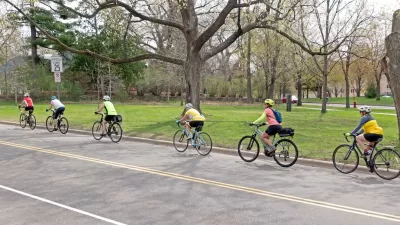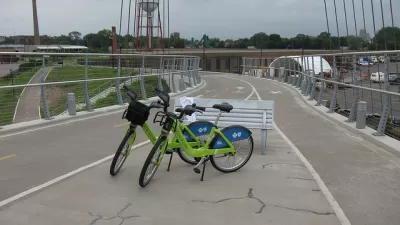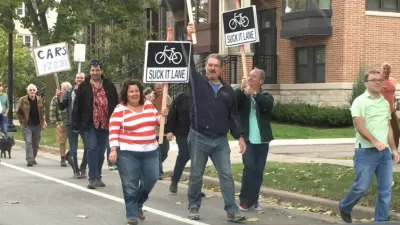Swatting down untruths and misinformation by bike lane opponents in St. Paul doesn't require a PhD, but it helps.

Writing in BeyondChron, Bill Lindeke sets the record straight on a few points used by bike lane opponents as St. Paul expands its bicycle path network through the city. Lindeke, a St. Paul Planning Commissioner who has a PhD in geography and bicycle planning, writes about his frustration at flyers given to neighbors along Cleveland Avenue, where opponents have stepped up efforts to block a bike lane on the street that would result in the loss of or shift of some street parking to side streets.
If you believe that your career depends on a parking space, there’s no amount of research, argument, or kindness that will convince you that a bike lane might benefit Cleveland Avenue.
And to make a long story short, this flier represents a dishonest argument about street design that appeals to those invested in the status quo. On the surface, these objections might seem reasonable. But they actually reflect how inflexibility about street design and urban transportation, in order to cling to slight comforts, keeps a dangerous precedent in place for another decade.
Opponents have cited the proposed reduction of driving lane widths on Cleveland from 12 feet to 11 feet as creating a dangerous situation, although as Lindeke points out, just the opposite is true. Statistics show that in the urban environment wider lanes are more dangerous than narrower lanes.
Opponents are also asking that the route be entirely "off-street" for safety reasons, or else the entire thing should be scrapped. Lindeke notes that "smart cities build infrastructure for the whole range of bicyclists and allow them to choose where and how quickly they want to ride… it turns into a spectrum of bicycle infrastructure." Asking for perfection or nothing is just another tool of opponents to block bicycle lane development, Lindeke argues.
FULL STORY: Two Anti-Bike Lane Narratives that Need to Stop

Alabama: Trump Terminates Settlements for Black Communities Harmed By Raw Sewage
Trump deemed the landmark civil rights agreement “illegal DEI and environmental justice policy.”

Planetizen Federal Action Tracker
A weekly monitor of how Trump’s orders and actions are impacting planners and planning in America.

Why Should We Subsidize Public Transportation?
Many public transit agencies face financial stress due to rising costs, declining fare revenue, and declining subsidies. Transit advocates must provide a strong business case for increasing public transit funding.

Understanding Road Diets
An explainer from Momentum highlights the advantages of reducing vehicle lanes in favor of more bike, transit, and pedestrian infrastructure.

New California Law Regulates Warehouse Pollution
A new law tightens building and emissions regulations for large distribution warehouses to mitigate air pollution and traffic in surrounding communities.

Phoenix Announces Opening Date for Light Rail Extension
The South Central extension will connect South Phoenix to downtown and other major hubs starting on June 7.
Urban Design for Planners 1: Software Tools
This six-course series explores essential urban design concepts using open source software and equips planners with the tools they need to participate fully in the urban design process.
Planning for Universal Design
Learn the tools for implementing Universal Design in planning regulations.
Caltrans
Smith Gee Studio
Institute for Housing and Urban Development Studies (IHS)
City of Grandview
Harvard GSD Executive Education
Toledo-Lucas County Plan Commissions
Salt Lake City
NYU Wagner Graduate School of Public Service





























